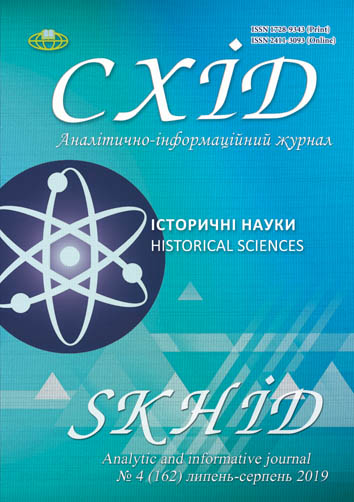The Western Ukrainian Association of the League of Nations: the Ideological Platform, Activity at the Congresses of the League of Nations Union of Associations (1922 - 1924)
DOI:
https://doi.org/10.21847/1728-9343.2019.4(162).177280Keywords:
The Western Ukrainian Association of the League of Nations, the League of Nations Union of Associations, the government of Western Ukrainian National Republic in exile, the Eastern Galicia, the Polish StateAbstract
The geopolitical changes in the international relations after the First World War, the new trends in European foreign policy, the increasing interest to the Ukrainian issue were the main reasons which intensified an interest of Ukrainian community to the issues of international policy. Founded in 1922 the Western Ukrainian Association of the League of Nations (WUALN) endeavored to facilitate the solution of the Ukrainian issue in the format of the LNUA, manifesting the idea of Ukrainian statehood renewal. Three periods can be defined in the association’s activity: the first includes the period from January-June 1922; it is the time of organization’s foundation and its entrance to the League of Nations Union of Associations (LNUA); the second (the main) period from the 8th of June 1922 to the 23rd of June 1923; it is the time of a full membership the WUALN in the Union; the third period from the 23rd of June to the 1st of July 1924 connected with the suspension of the WUALN’s membership in the LNUA and the association’s struggle for the rights’ renewal in the organization. The WUALN did not recognized the Treaty of Versailles about the division of the Ukrainian lands between the Soviet Union, Poland, Romania, Czechoslovakia; the Riga Peace Treaty’s ratifications of 1921 between Poland, the Soviet Union and the Ukrainian Republic included to the Soviet Union. The Association had the close contacts and cooperated with the WUNR’s government in exile, political parties from the Western Ukraine: Ukrainian National Labor Party (UNLP), Ukrainian Radical Party (URP), Christian Social Party (CSP), Ukrainian Parliament Representation (UPR) and other organizations. The association coordinated actions on the international scene and its tactics with the WUNR’s government in exile and E. Petruschevich personally; still the information about the misuses of the Polish government, the facts of violations from the Polish regime of the national minorities’ rights, non-performance of the international obligations of the Polish state was obtained from the other civil and political organizations of the WUALN. The contradictions between UNR and WUNR governments influenced on the relations with the Ukrainian Association of the League of Nations (UALN) from Naddniprianschyna in 1919-1920-s; notwithstanding in the strategical lines of the “Ukrainian issue’s” solution the both associations demonstrated solidarity and co-coordination that the congress of the LNUA demonstrated vividly in The Hague. However, the contacts with the members of Naddniprianschyna gradually activated after the temporary suspension of WUALN’s activity in the LNUA in 1923. At that period the UALN often defended the WUALN’s interests in the governing bodies of the LNUA, and the WUALN considered the variant of integration to the UALN on the autonomy rights.
Downloads
Downloads
Published
How to Cite
Issue
Section
License
Copyright (c) 2019 Ihor Soliar

This work is licensed under a Creative Commons Attribution-NonCommercial-NoDerivatives 4.0 International License.
1. Authors bear responsibility for the accuracy of facts, quotations, numbers and names used.
2. Manuscripts are not sent back.
3. The publisher does not always agree with the authors' opinion.
4. The authors reserve the right to authorship of the work and pass the first publication right of this work to the journal under the terms of a Creative Commons Attribution-NonCommercial-NoDerivatives 4.0 International License. This license allows others to distribute (copy) the published work for non-commercial purposes, provided there is mandatory attribution to its authors and a link to the first publication in our journal.
5. The authors have the right to conclude separate supplement agreements that relate to non-exclusive work distribution in the form in which it has been published by the journal (for example, to upload the work to the online storage of the journal or publish it as part of a monograph), provided that the reference to the first publication of the work in this journal is included.

